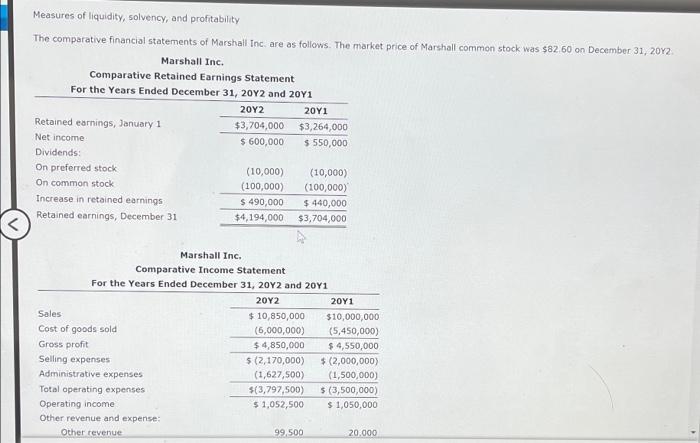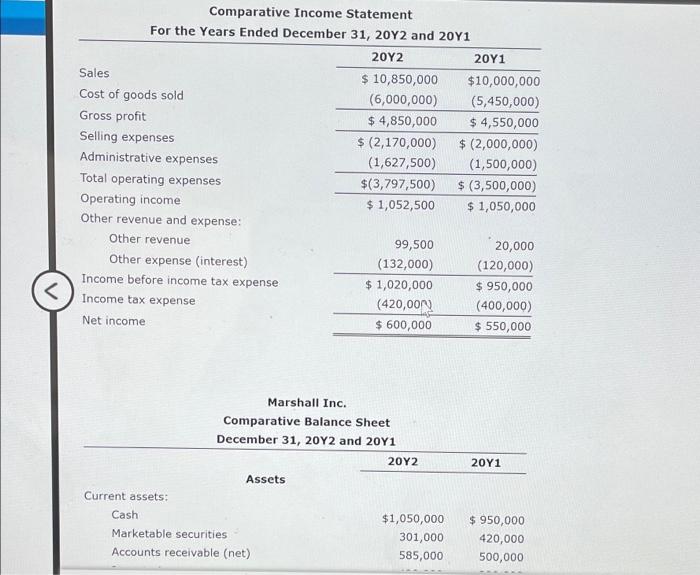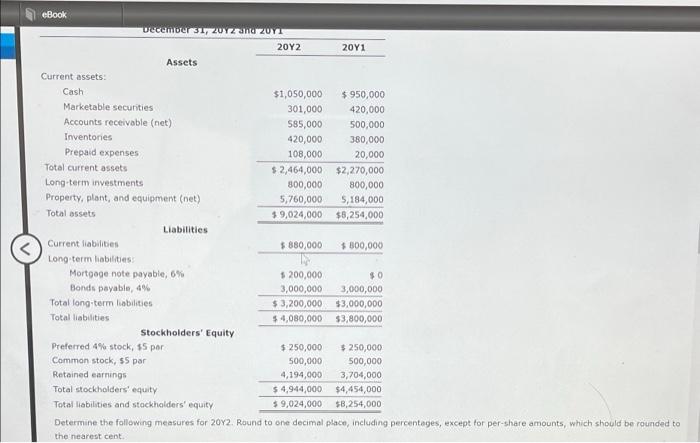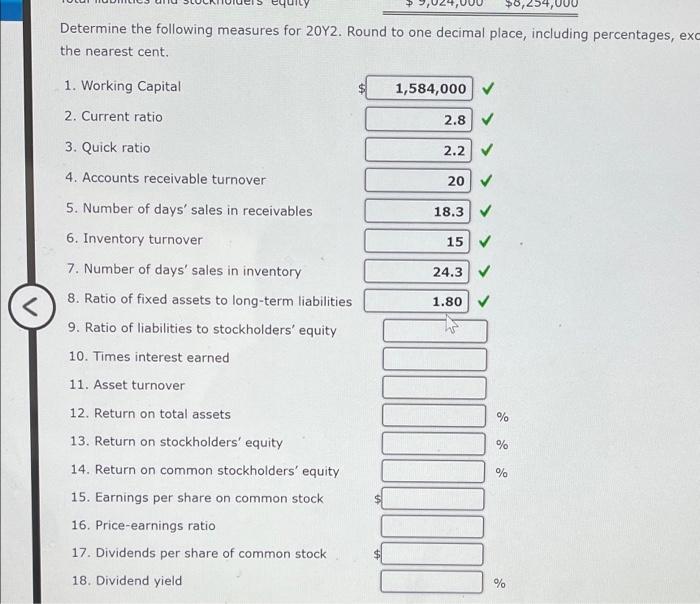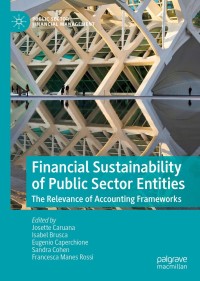Measures of liquidity, solvency, and profitability The comparative financial statements of Marshall Inc. are as follows. The market price of Marshall common stock was $82.60 on December 31, 2012. Marshall Inc. Comparative Retained Earnings Statement For the Years Ended December 31, 20Y2 and 20Y1 20Y2 20Y1 $3,264,000 Retained earnings, January 1 $3,704,000 Net income $ 600,000 $ 550,000 Dividends: On preferred stock (10,000) (100,000) (10,000) (100,000) On common stock Increase in retained earnings $ 490,000 $ 440,000 Retained earnings, December 31 $4,194,000 $3,704,000 Marshall Inc. Comparative Income Statement For the Years Ended December 31, 20Y2 and 20Y1 20Y2 Sales Cost of goods sold $ 10,850,000 (6,000,000) $ 4,850,000 $ (2,170,000) Gross profit Selling expenses Administrative expenses Total operating expenses (1,627,500) $(3,797,500) $ 1,052,500 Operating income Other revenue and expense: Other revenue 99,500 20Y1 $10,000,000 (5,450,000) $ 4,550,000 $ (2,000,000) (1,500,000) $ (3,500,000) $ 1,050,000 20.000 Comparative Income Statement For the Years Ended December 31, 20Y2 and 20Y1 20Y2 $ 10,850,000 (6,000,000) $ 4,850,000 $ (2,170,000) (1,627,500) $(3,797,500) $ 1,052,500 99,500 (132,000) $ 1,020,000 (420,000) $ 600,000 Sales Cost of goods sold Gross profit Selling expenses Administrative expenses Total operating expenses Operating income Other revenue and expense: Other revenue Other expense (interest) Income before income tax expense Income tax expense Net income Current assets: Cash Marketable securities Accounts receivable (net) Marshall Inc. Comparative Balance Sheet December 31, 20Y2 and 20Y1 Assets. 20Y2 $1,050,000 301,000 585,000 20Y1 $10,000,000 (5,450,000) $ 4,550,000 $ (2,000,000) (1,500,000) $ (3,500,000) $ 1,050,000 20,000 (120,000) $ 950,000 (400,000) $ 550,000 20Y1 $ 950,000 420,000 500,000 eBook 20Y2 20Y1 Current assets: Cash $1,050,000 $ 950,000 Marketable securities 301,000 420,000 Accounts receivable (net)) 585,000 500,000 Inventories 420,000 380,000 Prepaid expenses 108,000 20,000 Total current assets $2,464,000 $2,270,000 Long-term investments 800,000 800,000 Property, plant, and equipment (net) 5,760,000 5,184,000 Total assets $9,024,000 $8,254,000 Liabilities Current liabilities $ 880,000 $ 800,000 Long-term liabilities: Mortgage note payable, 6% $ 200,000 $0 3,000,000 Bonds payable, 4% 3,000,000 Total long-term liabilities $3,200,000 $3,000,000 Total liabilities $4,080,000 $3,800,000 Preferred 4% stock, 15 par $ 250,000 $ 250,000 Common stock, $5 par 500,000 500,000 Retained earnings 4,194,000 3,704,000 Total stockholders' equity $4,944,000 $4,454,000 Total liabilities and stockholders' equity $ 9,024,000 $8,254,000 Determine the following measures for 2012. Round to one decimal place, including percentages, except for per-share amounts, which should be rounded to the nearest cent. December 31, 2012 and 20Y1 Assets Stockholders' Equity $8,254,0 Determine the following measures for 20Y2. Round to one decimal place, including percentages, exc the nearest cent. 1. Working Capital 1,584,000 2. Current ratio 2.8 3. Quick ratio 2.2 4. Accounts receivable turnover 20 5. Number of days' sales in receivables 18.3 6. Inventory turnover 15 7. Number of days' sales in inventory 24.3 8. Ratio of fixed assets to long-term liabilities 1.80 9. Ratio of liabilities to stockholders' equity 45 10. Times interest earned 11. Asset turnover 12. Return on total assets 13. Return on stockholders' equity 14. Return on common stockholders' equity 15. Earnings per share on common stock. 16. Price-earnings ratio 17. Dividends per share of common stock 18. Dividend yield % % % %
